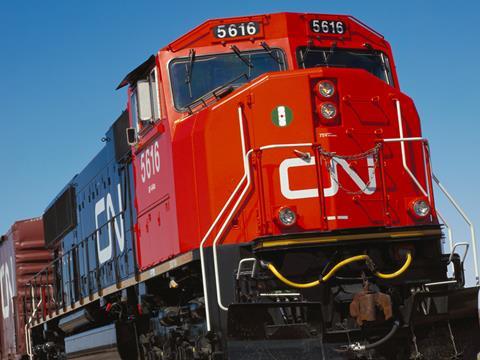
NORTH AMERICA: Having previously indicated that it did not intend to get into a bidding war with Canadian National to acquire Kansas City Southern, Canadian Pacific announced on August 10 that it had submitted a ‘superior proposal’ valuing the smaller railway at approximately US$31bn.
Enjoying the unanimous support of the CP board, the revised offer is worth around $300 per share. While it is still lower than the US$33·7bn offer from CN which was accepted by the KCS board in May, CP believes that it is ‘achievable’ and ‘pro-competitive’, offering ‘more regulatory certainty’ and ‘compelling short- and long-term value’.
Citing concerns over consolidation and reduced competition in the rail market, the US Surface Transportation Board has already indicated that it plans to assess the CN-KCS merger proposal under its tighter regulatory regime introduced from 2001. This places ‘a heavier burden on merger applicants to show that a major rail combination is consistent with the public interest’. A CP-KCS merger proposal would benefit from a waiver granted to the much smaller KCS for assessment under the rules that applied before 2001.

Stockholder meeting
A special meeting of KCS stockholders has been called for August 19 to ratify the CN deal, although the STB has yet to rule on an application from CN and KCS under which the smaller railway would be put into a voting trust to ensure its independence during the regulatory process.
The revised offer from CP also envisages the use of a voting trust, which had been agreed by STB before KCS withdrew from the earlier deal. Following the closing of the transaction, KCS common shareholders would will receive 2·884 CP common shares and $90 in cash for each share, while CP would assume $3·8bn of outstanding KCS debt. An increase of $25 per share on its earlier offer, the offer represents a 34% premium on the KCS share price of $224·16 on March 19. KCS stockholders would own approximately 28% of the combined company, as against 25%.
And in the same way that CN agreed to reimburse the penalty paid by KCS for ending its original merger agreement with CP, the new offer provides for CP to cover any termination fee for ending the CN deal, including a refund of the earlier penalty.
The time is right
In a letter to the KCS board, CP President & CEO Keith Creel said that CP ‘understood and respected’ the directors’ decision ‘to explore the path to a transaction with Canadian National’ but continued to believe that a CN-KCS merger was ‘not executable’ and would ultimately be rejected by the STB.

‘At the time of CN’s offer in May, we chose to not make a revised offer because we believed that engaging in a bidding war with CN would have been value destructive to CP shareholders, and we continue to stand by that decision’, Creel explained. ‘However, we believe that now is the right time for us to re-engage with KCS.’
He said KCS stockholders had been placed in the unfortunate position of having to vote on the proposed CN merger without ‘any level of certainty’ over whether the STB would approve CN’s use of a voting trust. Accepting an offer that was subsequently rejected by the regulator would prevent KCS from considering superior offers until the CN bid expired next February.
Creel continued to believe that a combination with of CP and KCS would be ‘a more certain transaction which offers compelling short-term and long-term value that is actually achievable’, reiterating that his railway already has STB approval to use a voting trust.
‘Unlike a combination with CN, a CP-KCS combination will be transformational in a positive manner for the railroad industry and will serve the best interests of our respective customers, shareholders and other stakeholders and the North American economy’, he insisted. ‘This end-to-end combination, with a focus on growth, would also ensure the viability of KCS’s full network going forward, without the need to address issues related to overlap as in the proposed CN merger.
‘KCS stockholders should not assume that there is any certainty of value in the proposed CN merger, given the level of uncertainty as to whether the STB voting trust approval or final approval of the combination will be obtained by CN’, Creel emphasised, citing President Biden’s recent executive order on Promoting Competition in the American Economy, and ‘the fundamental anticompetitive issues raised by the proposed CN merger’.

















